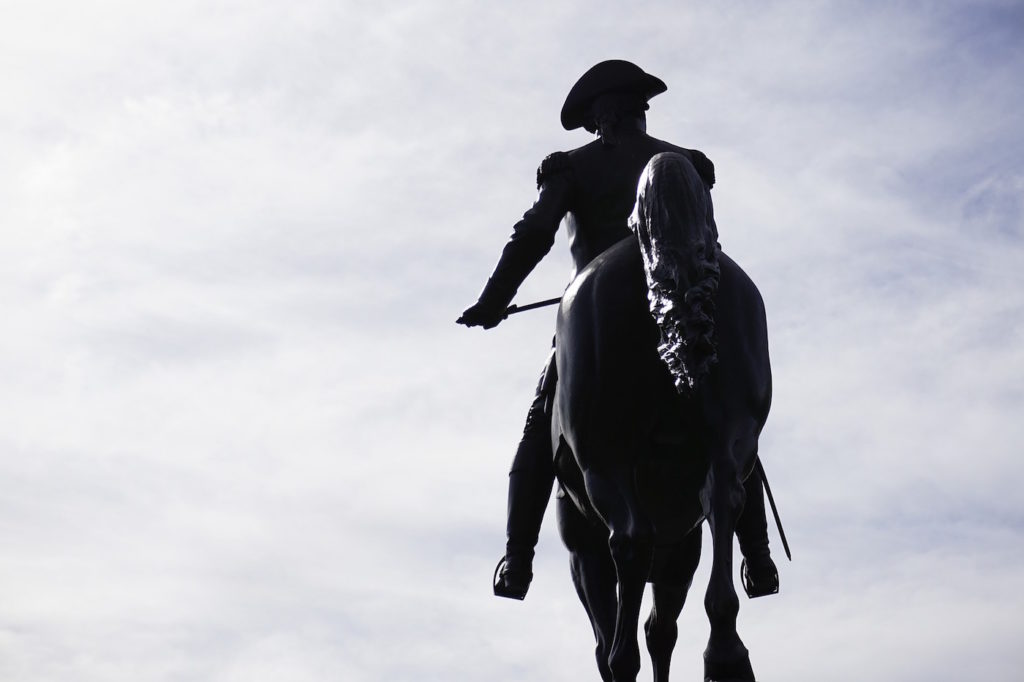I read my brother’s copy of Johnny Tremain when I was between eight and nine years old. As I did with so many of his books, I enraged him by drawing colorful portraits of the characters on his property’s half-blank pages. I didn’t attempt to tell the story in pictures. I just drew Johnny and Cilla and Isannah Lapham and the rest standing in lines. Perhaps the idea of historical dress exhibited in these crayon sketches is a tribute to the powerful historical imagination of the author, though my brother would not concur in this assessment.
Published in 1943, Johnny Tremain is the best-loved historical novel from the pen of Esther Forbes. Forbes’s novels all take place in colonial times. The author also wrote a Pulitzer Prize-winning biography of Paul Revere, who is featured as both silversmith and patriot in Johnny Tremain. In the novel, Johnny is a fourteen-year-old apprentice silversmith. He lives with his master, the Bible-reading Ephraim Lapham, the much younger, red-armed Mrs. Lapham, her four daughters, and two other, less gifted apprentices, Dusty and Dove, whom he rules and mercilessly bosses. Johnny has been informally engaged to Cilla Lapham, who, along with her younger, beautiful sister Isannah, loves to tease the prickly boy.
One night, Johnny discloses to Cilla that his mother told him on her deathbed that he belongs to the British Lyte family: she bequeathed him a cup that proves his genealogy. As dawn breaks, Johnny shows Cilla the cup to prove that he is not telling her tall tales. The wealthy Boston merchant John Hancock pulls up in his coach and horses to order a silver dish. Over the head of his doddering master, who made the original, Johnny promises to complete the difficult commission on time. Lapham’s decision to start the Sabbath rest on Saturday night forces Johnny to finish his work on Sunday. Handed a leaking crucible by Dove, Johnny burns his precious silversmith’s right hand.
Unable to continue his training or find another apprenticeship, Johnny is reduced to the point of desperation that his mother had required he reach before going for help to the arrogant British Lytes. The Tory Lytes will have no truck with Johnny and accuse him of stealing the cup. In court, Cilla and Izzy save Johnny’s neck by testifying that he showed them the cup months before the theft of a similar cup from the Lyte mansion. Out of luck, Johnny goes from door to door looking for work and finds a friend, Rab Silsbee, who gives him home and board in return for delivering the seditious newspaper he prints, the Boston Observer. Rab’s timid uncle Lorne edits the Boston Observer, and also hosts secret meetings of patriots. Johnny goes door to door to deliver the times of the secret meetings. The newspaper boy teaches himself to ride the beautiful and nervous horse Goblin and he learns to use his left hand to chop wooden chests. Johnny’s stay at the Boston Observer has made him a patriot.
Start your day with Public Discourse
Sign up and get our daily essays sent straight to your inbox.As the book ends, the colonies are beginning their military revolt against the British. The words and rhythms of the penultimate chapter closely echo Longfellow’s “Midnight Ride of Paul Revere.” The Lytes return to England, taking Isannah as their little pet. Johnny is told that his maimed hand can undergo sufficient surgery for him to soldier in the revolutionary army.
Three decades after that volume and I left our marks on one another, I had returned to my native England, become a theology professor, and lost contact with America past and present. I had a meeting with the head of an American think tank, and, groping for a point of connection, I told him that as a child Johnny Tremain was my favorite book. He said he read it to his children. Speaking meaningfully, as most people do to theology professors and visiting Martians, he told me that Johnny learns to outgrow the primitive superstition that his hand was burned as a divine punishment for working on Sunday. Johnny, he said, leaves the Biblical fundamentalist household of the Laphams with his maimed hand, and is reborn as an enlightened patriot in the offices and homes of the Boston Observer.
Seen through his perspective, the culminating contrast to the Laphams is the doctor, Joseph Warren, who knows scar tissue when he sees it, knows it is not the work of God, and knows how to cure a hand burned by silver and mangled by midwives. The book does contrast Lapham—the aging silversmith who, preferring to spend time with his Bible than in his workshop, figures out from Levitical law that the Sabbath should begin on Saturday night, and obstructs the completion of the prize commission—with Doctor Warren, a man dedicated to curative empirical observation. It was a surprising reading to me, at first mention, but it would come as little surprise to many Christians today, who share the agnostic scholar’s conception of the incompatibility of Enlightenment liberalism with their own Christian belief.
The dawn of the overthrow of tyranny, when the American patriots stand up to face the deadly eyes of the British muskets at Lexington and Concord, would then include demolishing the tyranny of Biblical, religious belief. Late in the novel, when Johnny peruses the pages of the Lyte family Bible in which the family genealogy has been inscribed, with his mother’s name deliberately obscured by decorations, he first cuts out the pages, thinking they may be of some use, and then, moments later, burns them. It’s as if Johnny must cancel and burn his entire genealogy, everything his family stands for, including the literalist faith of his forefathers, if he is to enter the dawning Enlightenment in which, as James Otis famously preaches, “a man can stand up.” The most famous line in the book, the line that anyone will recite to you if you mention Johnny Tremain, “that a man can stand up,” seems anti-religious, since its most memorable presentation of religion is of a confining, close-minded Bible literalism. The outstanding narrative arc of the book seems to carry Johnny away from the pious, bigoted Laphams and toward the open-minded, philanthropic Doctor Warren.
Certainly, in the novel as in real history, the American Revolution is not accomplished by pious Puritans. A new kind of religious spirit animates them. Nonetheless, some features of the book complicate my acquaintance’s rather literal-minded reading of Johnny Tremain. In the opening pages of the book Johnny himself is described as an autocrat and a tyrant. Before his accident, Johnny bosses the other apprentice boys with unthinking arrogance. Dove, the apprentice boy who deliberately hands Johnny a busted crucible on that fateful Sunday, does so because he hates the servitude in which Johnny maintains him. The pride that old Lapham requires Johnny to renounce at the family Bible reading is a real feature of his character, and one that has to die before he himself can stand up against political tyranny. The metaphor is plain to behold in the novel, where Johnny convalesces from his burn in the Lapham’s tiny “birth and death room.” Johnny’s belief that his “accident” is somehow an act of God—that it is, in some way a providential rebuke to his own arrogance—is not mere superstition. By contrast, Lavinia Lyte’s flouting the laws against riding on Sunday is not presented as part of the spirit of liberty, but rather of pride and arrogance. For Lavinia Lyte, freedom is taking what she wants for herself and enjoying it. She shows off her skillful control of a rearing horse to Johnny, but he must help her dismount. “That a man can stand up,” does not mean arrogantly rearing up over against other human beings or the law. It takes a certain humility to be able to stand up humanly; Johnny has to die metaphorically and to be reborn in order to achieve it.
Death and rebirth metaphors do not make a book Christian, not even an anonymous one. Humility in this book is not humility in the face of God (the Biblical opposite of pride), but rather, the humility not to treat others like one’s own property (as Lavinia Lyte does with Izzy Lapham). The humility important in this story is related to a sense of equal human dignity. It means not stacking low-ranking soldiers like pieces of wood, as the British army does with its own wounded men: “Most of them were pathetically good and patient, but he saw an officer strike a man who was screaming. . . . ‘Because a man is a private,’” Johnny thinks, “‘there is no reason he should be treated like cordwood.’” This is not religious humility per se, but a moral humility that acknowledges that no human being is just a thing.
The religiosity that marks the book comes from James Otis’s question to the secret conclave of rebels on the eve of the Revolution. Standing to face them like a preacher with his hands stretched above him on the beams of the attic, Otis asks them the purpose of the sacrifice they will make. For what, looking at Hancock, will you give up your carriage and property? For what, looking at straight at Rab, as Johnny notices with trepidation, will you lay down your young lives? The sacrifice is for freedom, freedom defined in a specifically human and personal way: so that a man can stand up.
Standing up on our hind legs is a distinguishing mark of the human person. The novel focuses in its first part on hands, on Johnny’s silversmithing hands and his damaged hand, his inability to be apprenticed in a new craft without working hands, his learning to chop and to write with his left hand. Then, as the book rushes to its conclusion, the focus moves to feet, to that humanizing ability to stand on one’s two feet. Thus, the human person is characterized here very concretely, in terms of working hands and grounding feet: In this novel, it is ultimately not only craft-working hands, but also feet that make the human person capable of achieving liberty.
Freedom can be characterized in many ways: it can be defined in such a way that “freedom” accrues to classes or to nations or to collectivities. In Johnny Tremain, freedom is defined in a way that specifically attaches to individual human persons. And yet, as the death of Rab shows, the freedom of the human person is not merely about self-assertion. Rather, freedom is what is worth dying for: the freedom of the human person merits the sacrifice of the self. This is the deep religious core of Johnny Tremain, ending inescapably with the death of Rab, with that trickle of blood from his mouth that defeats even the good Doctor Warren.
Johnny Tremain is a liminal secular-religious book. It is on the border between the two, broad enough on both sides to pose a challenge in either direction. It challenges its secular readers to have a deep enough conception of the secular to encompass dying for the sake of freedom. It challenges its religious readers to deepen their pieties sufficiently to encompass the aspiration for freedom that is written in the human frame. It shows that the constitution of liberty is engraved in the human form itself, and that is why it remains one of my favorite books.













